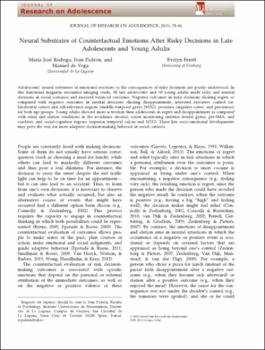Neural Substrates of Counterfactual Emotions After Risky Decisions in Late Adolescents and Young Adults
Date
2018Abstract
Adolescents’ neural substrates of emotional reactions to the consequences of risky decisions are poorly understood. In
this functional magnetic resonance imaging study, 30 late adolescents and 30 young adults made risky and neutral
decisions in social scenarios and received valenced outcomes. Negative outcomes in risky decisions eliciting regret, as
compared with negative outcomes in neutral decisions eliciting disappointment, activated executive control (orbitofrontal cortex) and self-relevance regions (middle temporal gyrus [MTG], posterior cingulate cortex, and precuneus)
for both age groups. Young adults showed more activation than adolescents in regret and disappointment as compared
with relief and elation conditions in the avoidance (insula), action monitoring (inferior frontal gyrus, pre-SMA, and
caudate), and social-cognition regions (superior temporal sulcus and MTG). These late socio-emotional developments
may pave the way for more adaptive decision-making behavior in social contexts.





